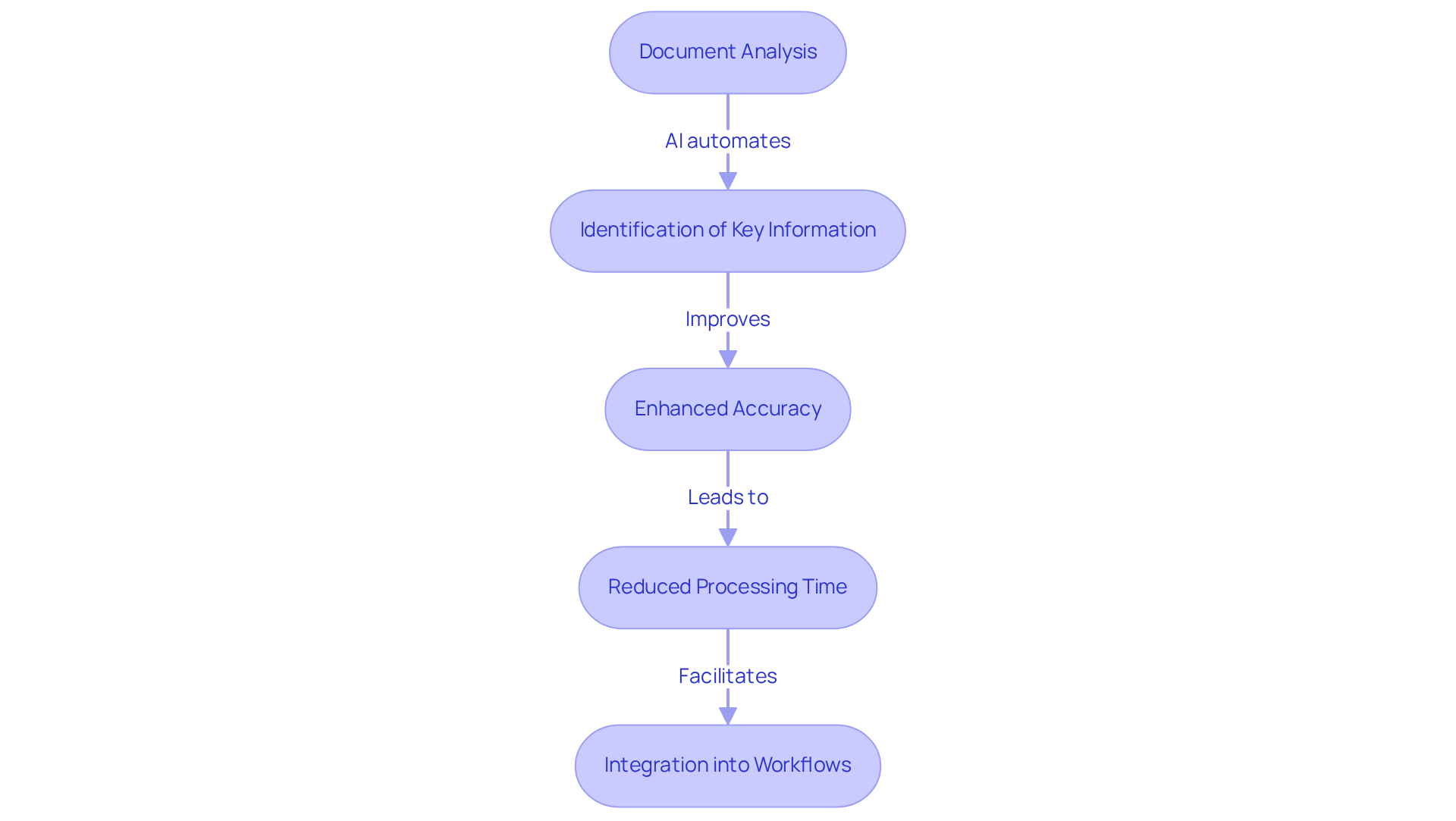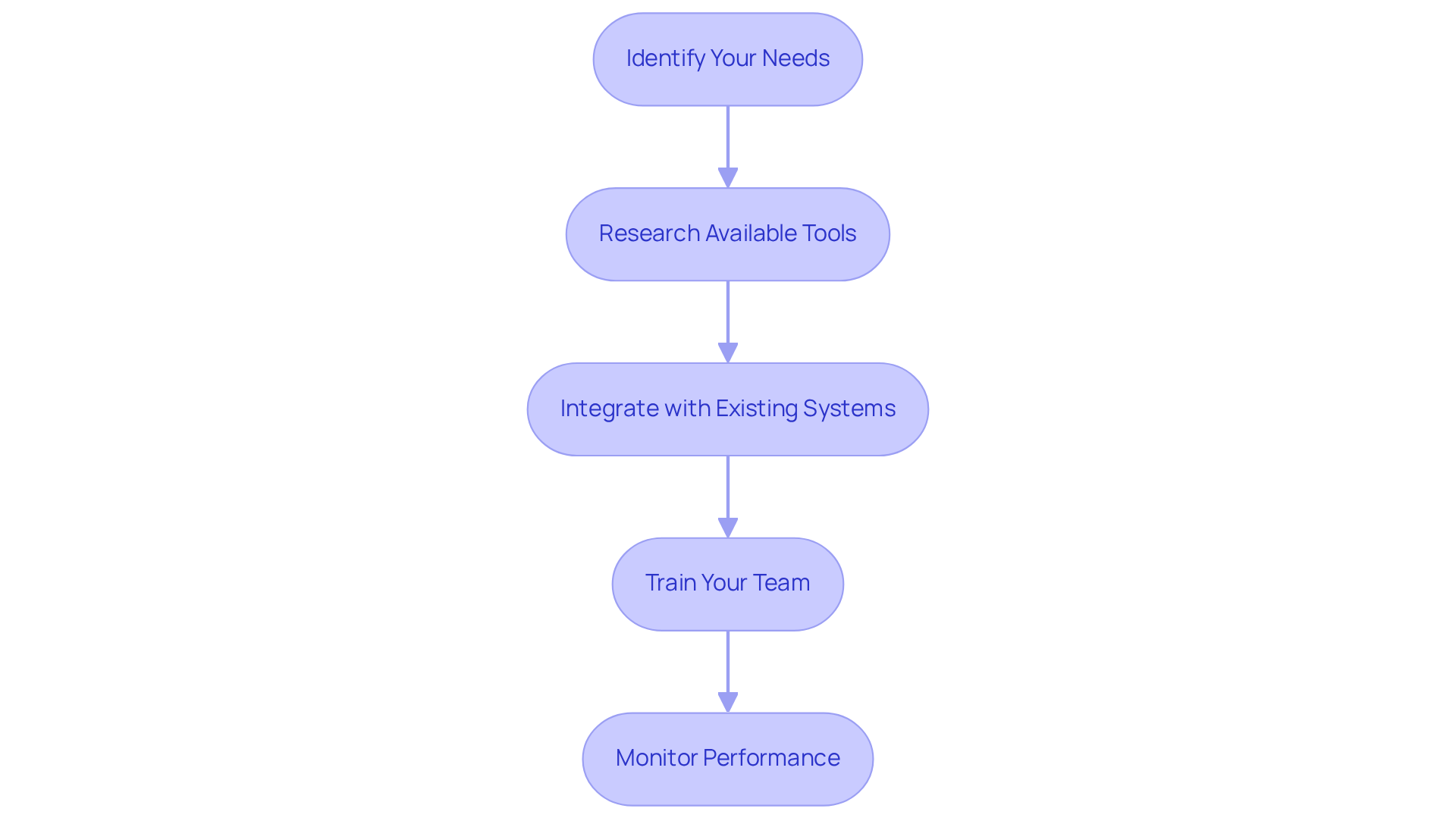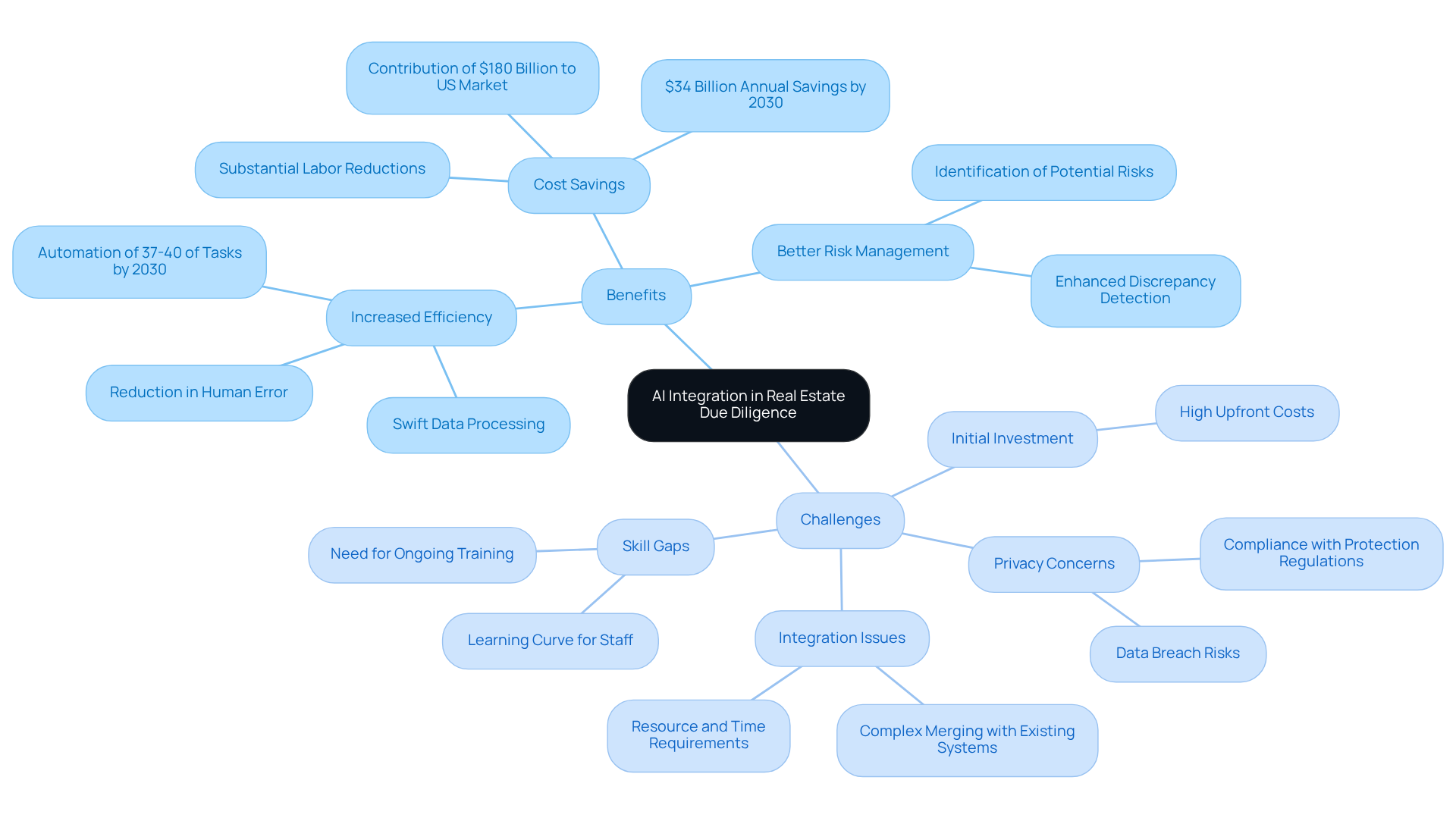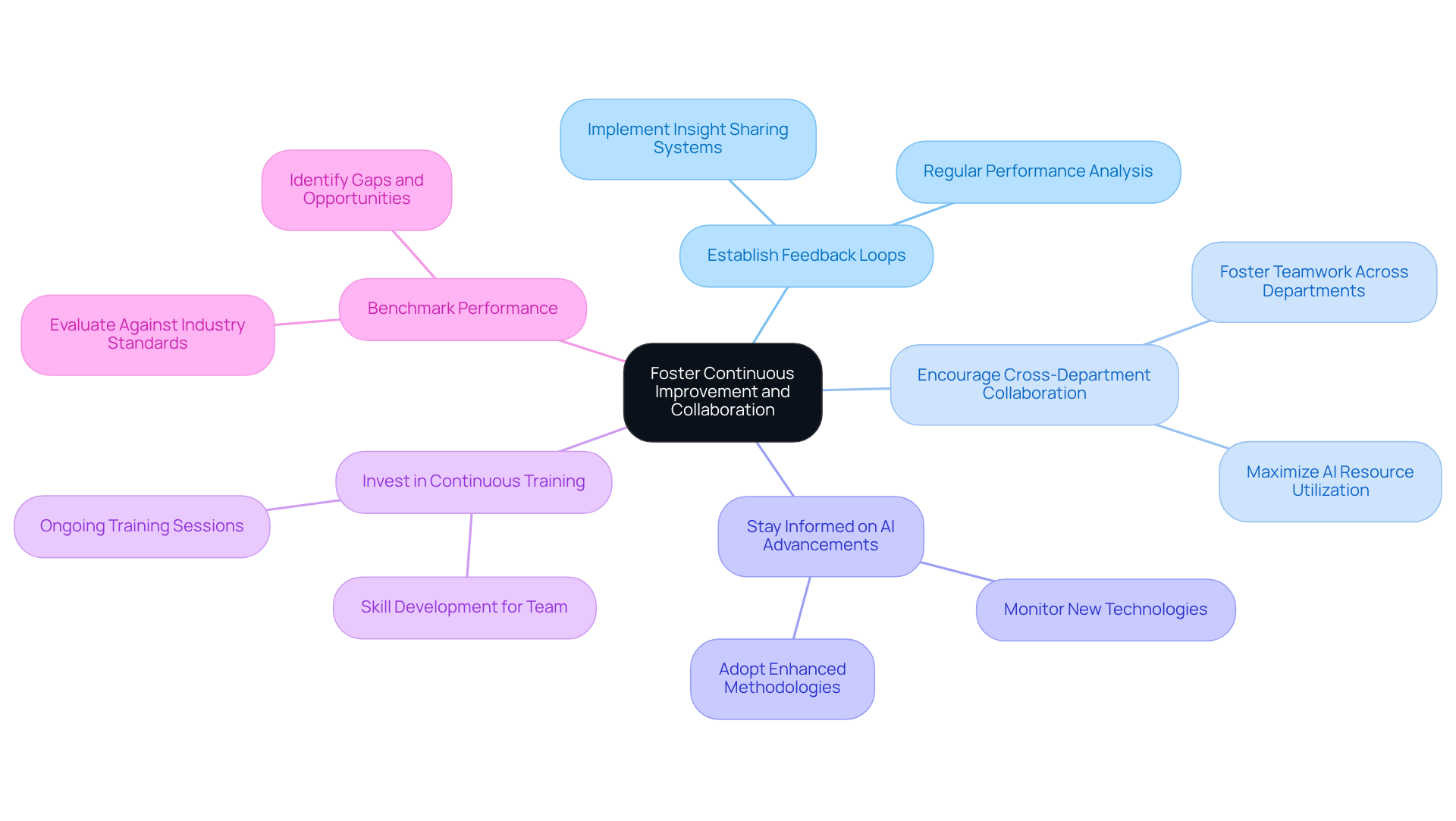Overview
AI enhances real estate due diligence by automating document analysis, significantly accelerating the review process while improving accuracy and minimizing human error. This article highlights AI's capabilities in identifying essential property information and bolstering risk management. Consequently, these advancements lead to more informed decision-making and considerable cost savings within the industry.
Introduction
AI is fundamentally reshaping the landscape of real estate due diligence, delivering efficiencies and accuracy that were once deemed unattainable. By automating the analysis of extensive documentation, AI not only accelerates the due diligence process but also significantly enhances risk management and opportunity identification for property professionals. Furthermore, as the industry embraces these technological advancements, it faces challenges regarding integration and the skills necessary to leverage AI effectively.
Consequently, how can real estate professionals navigate this transformative journey to fully harness the potential of AI in their due diligence processes?
Understand AI's Role in Real Estate Due Diligence
AI is revolutionizing property due diligence, illustrating how AI supports real estate due diligence by automating and enhancing document analysis processes. By significantly accelerating the review of extensive title documents, AI reduces human error and improves information consistency. Advanced algorithms can swiftly identify crucial information such as ownership history, liens, and encumbrances, empowering property professionals to make informed decisions based on precise details. This capability not only expedites the due diligence process but also illustrates how AI supports real estate due diligence by enhancing the accuracy of property assessments, ultimately leading to improved risk management and opportunity identification.
Recent advancements in AI, particularly in machine learning and optical character recognition, enable applications to efficiently extract relevant details from unstructured data. This transformation is illustrated in case studies where firms have reported processing time reductions of up to 70%, highlighting the tangible benefits of AI in document analysis. Furthermore, a 2023 survey revealed that 28% of property companies were in the early stages of adopting AI, underscoring the growing recognition of its potential within the sector.
To fully leverage how AI supports real estate due diligence, professionals in the industry must familiarize themselves with the available AI resources, comprehend their functionalities, and explore methods for seamless integration into existing workflows. This foundational knowledge is essential for understanding how AI supports real estate due diligence, which helps professionals maximize advantages and remain competitive in a rapidly evolving market. As industry experts note, "AI-driven property management platforms have the potential to boost rental income by up to 9% while reducing maintenance costs by as much as 14%," underscoring the financial benefits of adopting AI technologies.

Implement AI Tools for Efficient Title Research
To effectively implement AI tools for efficient title research, consider the following steps:
-
Identify Your Needs: Start by evaluating the specific challenges in your title research procedures, such as time constraints or accuracy issues. Recognizing these needs will assist you in selecting the most suitable AI resources.
-
Research Available Tools: Investigate various AI platforms that specialize in title research. Look for features such as document scanning, data extraction, and compliance checks. Platforms like Parse AI can significantly enhance your workflow by automating repetitive tasks, allowing for quicker and more accurate results. Notably, KPMG saved 200,000 hours by integrating AI into their workflows, demonstrating the tangible benefits of such resources.
-
Integrate with Existing Systems: Ensure that the AI solutions you choose can seamlessly connect with your current systems. This compatibility minimizes disruptions and encourages user adoption, facilitating a smoother transition for your team.
-
Train Your Team: Conduct training sessions to familiarize your team with the new resources. Emphasize the advantages of AI in improving efficiency and accuracy in title research, which can lead to significant time savings and cost reductions. With 65% of companies regularly using generative AI in 2024, it is crucial to equip your team with the necessary skills to leverage these technologies effectively.
-
Monitor Performance: After implementation, continuously observe the performance of the AI systems. Collect feedback from your team to identify areas for improvement and make necessary adjustments to optimize their use.
By following these steps, property professionals can effectively utilize AI tools to streamline their title research processes, demonstrating how AI supports real estate due diligence, ultimately enhancing productivity and reducing operational costs. With nearly 50% of organizations now deploying AI across multiple business functions, the integration of AI in title research is not merely a trend but a strategic necessity for maintaining competitiveness in the market.

Evaluate Benefits and Challenges of AI Integration
Integrating AI into real estate due diligence highlights how AI supports real estate due diligence by offering a multitude of advantages while also presenting significant challenges. A thorough examination reveals the following insights:
Benefits:
-
Increased Efficiency: AI can swiftly process vast amounts of data, drastically reducing the time required for due diligence. This efficiency is crucial in a market where speed can dictate competitive advantage. Notably, with 37-40% of tasks projected to be automated by 2030, firms that adopt AI now are strategically positioned to dominate operationally by the decade's end. By minimizing human error, AI tools markedly improve the precision of data extraction and analysis, demonstrating how AI supports real estate due diligence by resulting in more reliable outcomes. This is particularly vital in title research, where accuracy is of utmost importance.
-
Cost Savings: Automating repetitive tasks can lead to substantial reductions in labor and operational costs. Research indicates that AI could unlock $34 billion in annual savings across the property sector by 2030, underscoring its potential for financial efficiency. Furthermore, McKinsey projects that AI in real estate is expected to contribute over $180 billion annually to the US market, highlighting the transformative potential of AI in the industry.
-
Better Risk Management: This demonstrates how AI supports real estate due diligence by excelling in identifying potential risks and discrepancies in property records that may be overlooked during manual reviews, thereby enhancing overall risk management strategies.
Challenges:
-
Initial Investment: The upfront costs associated with implementing AI technologies can be substantial, posing a barrier for some organizations, particularly smaller firms.
-
Privacy Concerns: Managing sensitive property information raises compliance issues with protection regulations, necessitating robust security measures. Specific compliance challenges must be addressed to mitigate risks associated with data breaches.
-
Integration Issues: Merging AI applications with existing systems can be complex, often requiring additional resources and time to ensure seamless functionality.
-
Skill Gaps: There may be a steep learning curve for staff to effectively utilize AI tools, emphasizing the need for ongoing training and support to maximize the technology's benefits.
By thoroughly evaluating these benefits and challenges, property professionals can formulate a strategic approach for AI integration that highlights how AI supports real estate due diligence while addressing potential drawbacks.

Foster Continuous Improvement and Collaboration
To enhance continuous improvement and collaboration in the application of AI for real estate due diligence, consider the following strategies:
-
Establish Feedback Loops: Implement systems that enable team members to share insights on AI system performance. Regularly analyze this feedback to pinpoint areas needing enhancement.
-
Encourage Cross-Department Collaboration: Foster teamwork among various departments, including legal, compliance, and IT, to maximize the effective use of AI resources throughout the organization.
-
Stay Informed on AI Advancements: The AI landscape is rapidly changing. Stay informed about new technologies and methodologies that can enhance your existing resources and processes.
-
Invest in Continuous Training: Provide ongoing training sessions to ensure your team stays skilled and fully utilizes AI resources to their maximum potential.
-
Benchmark Performance: Regularly evaluate the performance of your AI tools against industry standards and best practices. This assessment will help identify gaps and opportunities for improvement.
By adopting these strategies, real estate professionals can maintain the effectiveness and efficiency of their AI applications, ensuring alignment with industry advancements and ultimately understanding how AI supports real estate due diligence to achieve superior outcomes.

Conclusion
AI is fundamentally transforming the landscape of real estate due diligence. It streamlines processes, enhances accuracy, and enables professionals to make informed decisions with greater confidence. The integration of AI technologies accelerates the review of extensive property documents and minimizes human errors, leading to more reliable outcomes. As the industry increasingly recognizes the importance of AI, understanding its functionalities and applications becomes essential for maintaining a competitive edge.
Throughout this article, key insights regarding the implementation of AI tools for efficient title research have been shared. The evaluation of benefits and challenges associated with AI integration, along with strategies for fostering continuous improvement and collaboration, has been discussed. The advantages of AI—such as increased efficiency, cost savings, and better risk management—are compelling reasons for real estate professionals to embrace these technologies. However, awareness of potential challenges, such as initial investment costs and integration complexities, is equally important for a successful transition.
Ultimately, the integration of AI in real estate due diligence is not merely a trend; it is a strategic necessity that can lead to significant financial benefits and operational efficiencies. As the industry evolves, staying informed about advancements in AI and investing in ongoing training will empower professionals to leverage these tools effectively. Embracing AI-driven solutions will enhance productivity and position firms to thrive in a competitive market, making it imperative for all stakeholders to adapt and innovate in this dynamic environment.
Frequently Asked Questions
How is AI changing property due diligence in real estate?
AI is revolutionizing property due diligence by automating and enhancing document analysis processes, significantly accelerating the review of extensive title documents, reducing human error, and improving information consistency.
What specific capabilities does AI provide in property due diligence?
AI can swiftly identify crucial information such as ownership history, liens, and encumbrances, enabling property professionals to make informed decisions based on precise details.
What are the benefits of using AI in the due diligence process?
The use of AI expedites the due diligence process, enhances the accuracy of property assessments, and ultimately leads to improved risk management and opportunity identification.
What advancements in AI are impacting real estate due diligence?
Recent advancements in machine learning and optical character recognition enable applications to efficiently extract relevant details from unstructured data, leading to significant reductions in processing times.
What evidence supports the effectiveness of AI in document analysis?
Case studies have reported processing time reductions of up to 70% due to AI's capabilities in document analysis.
What percentage of property companies are adopting AI, according to recent surveys?
A 2023 survey revealed that 28% of property companies were in the early stages of adopting AI, indicating a growing recognition of its potential in the sector.
What should real estate professionals do to effectively use AI in due diligence?
Professionals should familiarize themselves with available AI resources, understand their functionalities, and explore methods for seamless integration into existing workflows to maximize advantages and remain competitive.
What financial benefits can AI-driven property management platforms provide?
AI-driven property management platforms have the potential to boost rental income by up to 9% while reducing maintenance costs by as much as 14%.




